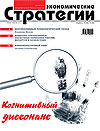A View in the Retrospect of Time: A History of State and Business Interaction. Marxist’s Interpretation in the Pre-October 1917 Period
The following two lectures of the series on the role of State in the economy (see ES–2016, N 2, 3, 4) deal with Concepts of the founders of Marxism and their adepts respectively, in the pre-October 1917 and the post-October period on the directions, methods and goals of the State economic policy towards the building of so-called communist society. I identify the vector of economic thought in a separate section due to significant influence that Marxism and Leninism ideas had impinged on the Economics and Politics. A rising tide of interest in the Marxist ideas in some social strata and countries nowadays is due to a slowdown in the global economy and to the aggravation of socio-economic problems. The Marxist views analysis of the State’s attitude towards entrepreneurship is needed to identify the roots of the tragic events that occurred in the twentieth century, and which mark the centenary in 2017.






